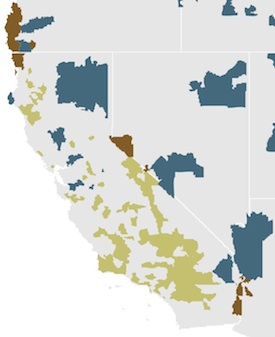
Frontier has claimed the blue and brown areas, but Verizon could leave the yellow areas behind. Click for a closer look.
Frontier Communications is the first of the larger U.S. telephone companies to take up the Federal Communications Commission’s offer of several years of subsidies in exchange for upgrading broadband infrastructure in rural areas to a minimum service level of 10 Mbps download and 1 Mbps upload speeds.
The FCC announced yesterday that Frontier had said yes to its right of first refusal on money from the second phase of the Connect America Fund program. In California, Frontier will be getting $6.1 million to upgrade 13,000 homes and businesses in its current service area.
That’s a nice chunk of change, but there’s the prospect of even more. The FCC has allocated $32 million for 52,000 homes in Verizon’s California wireline territory, which will soon be sold to Frontier, if the California Public Utilities Commission and other agencies approve the pending deal.
But the combination of time and bureaucratic requirements might keep that money out of Frontier’s hands. The problem is that the decision on Frontier’s purchase of Verizon’s Californian customers isn’t likely to come much before the end of the year, while the deadline for picking up the FCC’s option is in August.
The usual procedure would be for Verizon to claim the money in California (and Texas and Florida, which are part of the deal) so Frontier could assume the subsidies if the deal is approved and if it wants Verizon’s share. But upgrading wireline systems, with or without subsidies, is not part of Verizon’s game plan, and if the deal doesn’t go through it would be stuck with a commitment it won’t want to honor.
It’s possible – at least it’s worth hoping – that there’s an understanding between Frontier and Verizon regarding the Connect America Fund and other broadband subsidy programs with a short deadline. Otherwise, a hundred thousand or more rural Californians could miss what might be their best chance for better broadband.
